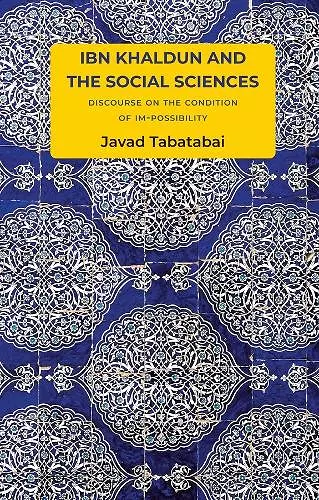Ibn Khaldun and the Social Sciences
Discourse on the Condition of Im-possibility
Javad Tabatabai author Philip Grant translator
Format:Paperback
Publisher:John Wiley and Sons Ltd
Published:1st Nov '24
Should be back in stock very soon
This paperback is available in another edition too:
- Hardback£55.00(9781509551354)

This insightful book delves into Ibn Khaldun's contributions to social sciences, exploring the interplay between tradition and modernity in the Middle East.
Arabic and European studies of Ibn Khaldun, the eminent medieval polymath, often diverge into two distinct interpretations. One perspective views his Muqaddimah ('Prolegomenon'), authored in 1377, as a seminal work marking the dawn of the social sciences. Scholars from this camp argue that Ibn Khaldun's 'new science of culture' can be seen as a precursor to sociology or as an Islamic counterpart to the discipline. Conversely, the alternative interpretation confines the Khaldunian discourse within the Islamic–Aristotelian framework of its era, dismissing the epistemological innovations of the Muqaddimah and relegating the science of culture to a minor role within the Aristotelian curriculum.
In Ibn Khaldun and the Social Sciences, Javad Tabatabai charts a novel course by exploring the conditions that render the social sciences impossible within the Islamic–Aristotelian paradigm. He theorizes that the 'scientific revolution' is hindered by an 'epistemic obstacle' to modernity within Islamic civilization. This exploration revisits Michel Foucault's ideas regarding the conditions necessary for the human sciences, contextualizing them within the historical backdrop of Christian–Aristotelian thought and the broader French epistemological debates from Bachelard to Althusser.
Tabatabai presents a critical theory of tradition and modernity in the Middle East, emphasizing a historical context where social and human sciences emerged through colonial and post-colonial translations of European discourse. This development represents a significant epistemological break from inherited knowledge traditions. Within this framework, the author underscores the importance of reactivating Ibn Khaldun's critical assessment of traditional limits, suggesting it offers a political-theological horizon for renewal.
"After Kant and Foucault, here is Javad Tabatabai’s version of What is Enlightenment? Tabatabai demonstrates that despite his undeniable genius, Ibn Khaldun, considered the founder of social sciences in the XIVth century, was unable to operate the critical revolution that his vision of science required. More than a book on Iran though, and a reflection on all its epistemological obstacles, Tabatabai's masterpiece offers a profound meditation on the creative resources that secretly hide behind any condition of impossibility."
Catherine Malabou, Professor of Philosophy, Kingston University
ISBN: 9781509551361
Dimensions: 229mm x 152mm x 28mm
Weight: 522g
352 pages